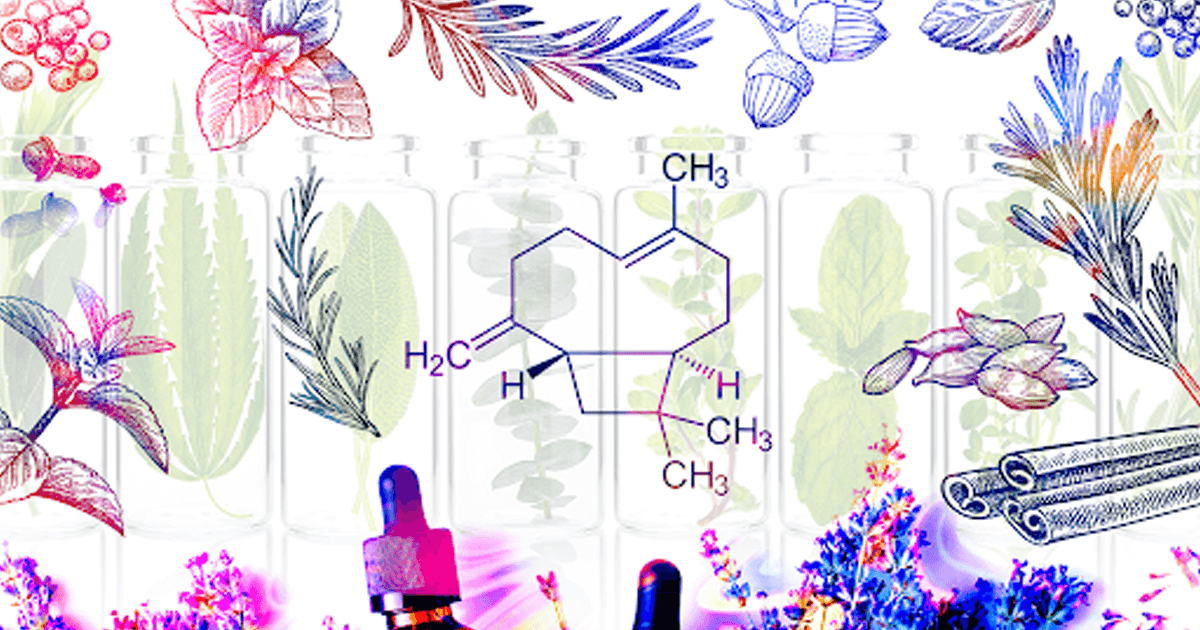BETA-CARYOPHYLLENE/B-CARYOPHYLLENE — WHAT IS IT?

Beta-caryophyllene (BCP) is a bicyclic sesquiterpene (versus the monoterpene myrcene which we explored last week) prevalent throughout not just cannabis, but throughout much of your favorite foods. Expressed in the essential oils of many of the plants it inhabits, beta-caryophyllene engages strongly with several different neurotransmitters, receptors and channels throughout the body. Suffice it to say that beta-caryophyllene does a LOT of good in the body, and while there are no studies yet pairing it with cannabinoids, let’s just say we’re pretty happy anyway that BCP is a natural part of cannabis’s complete entourage effect.
BETA-CARYOPHYLLENE AND THE ENDOCANNABINOID SYSTEM
BCP is sometimes referred to as an “atypical” or “dietary” cannabinoid thanks to its activity as a CB2 receptor agonist. Namely, it’s a FULL selective agonist, which means that it works to reduce all sorts of pain indicators, from neuropathy to nociception (these are the messages received by our nervous system that interpret sensations as painful).
It’s also extremely safe and barely toxic. A study found conducted in rats that it took 5000 mg/kg to kill half of a test population — far more than most animals or humans are going to consume in one sitting. Like most terpenes, it’s particularly tasty. It’s responsible in part for the aroma of black pepper and oregano — yet another reason why food is one of our Seven Pillars.
WHERE CAN BETA-CARYOPHYLLENE BE FOUND
 FOODS
FOODS
- Cinnamon
- Basil
- Breakfast Mint
- Coriander
- Chestnut
- Sage
- Cubeb Pepper
- Thyme
- Myrrh
- Curry Leaves
- Hops
- Cloves
- Lavender
- Rosemary
- CANNABIS STRAINS
- GG4
- Chemdawg
- Candyland
- Master Kush
- Bubba Kush
- Citrus Skunk
- Gelato
- Banana Kush
BETA-CARYOPHYLLENE EFFECTS
Because of its ability to trigger the CB2 receptor, attention has been drawn to its potential for assisting in pain relief and inflammation. However, other applications are being examined both resulting and apart from its endocannabinoid system effects, such as…
Wound Healing: Because of its anti-inflammatory effects, a paper explored whether it could be used to treat wounds. A mice study showed “increased cell proliferation” and migration. The paper concluded that BCP, along with other compounds found in essential oils may “have the capability to improve wound healing, an effect generated by synergetic impacts of multiple pathways.”
COVID: In the ongoing search to treat the most dramatic cases of COVID, BCP has also been suggested as a possible treatment for reducing inflammation and the well-documented “cytokine storms.” These are only speculative at the moment, but promising, given BCP’s ubiquity and general safety.
Neuroprotective: A 2018 review found a host of exciting futures for BCP, including immunomodulatory, anti-neuroinflammatory and cytoprotective effects. Evidence was also found for oxidative stress relief as well, and the paper also discusses possible applications as a substitute for more problematic sedatives and pain relievers.
In short, whether it’s the mind, the heart, the liver or the kidneys, BCP exhibits properties that can protect them and more. A biotech startup that could create such a compound would be worth billions, but instead, it’s probably in your kitchen counter. We’re only just now beginning to plumb its depths.
ETHAN RUSSO’S SYNERGISTIC SUGGESTIONS
In his seminal paper “Taming THC,” Dr. Russo suggests several different synergies beta-caryophyllene may form with specific cannabinoids to treat disease. Listing a paper noting antipruritic effects (this involves nasty itching) secondary to cholestatic liver disease with synthetic cannabinoids, Russo wonders if beta could assist in this. He also suggests its effects on pain might synergize with CBG, and even suggests a potential addiction treatment. One experiment involving essential oils of black pepper — which also contain cannabis terpenes myrcene and pinene alongside beta-caryophyllene — “reduced nicotine craving significantly.” A 2011 presentation also showed where BCP reduced self-administration of cocaine in an animal model.

Medicine Box is your one-stop-shop for the highest quality cannabis goods, heritage, and wisdom. Together, we share a common goal of cannabis culture preservation and ongoing education.
Read more Medicine Box / Beard Bros collaborations HERE
You can learn more about Medicine Box – and sign up for a free course on terpenes – HERE
- Chicago Police Department Revises Policy on Searches Based Solely on Marijuana Odor
- Ohio’s Senate Bill 56 Postponed, Leaving Details of Issue 2 Still Unresolved
- Sports Stars and Well Known Entertainers Join Forces Calling on Trump for Cannabis Reform
- Pinsky and the Brain: Bill White on His Journey to Consulting in Cannabis
- Delaware’s Recreational Cannabis Market Finally Set to Launch After Years of Challenges
- Excise Tax Increase to 19% and Its Impact on California Retailers














